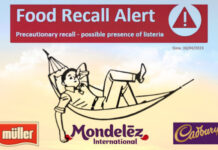Listeria, Spain declares outbreak almost a month late in peak tourist season. Listeriosis has affected at least 150 people in Andalusia, with two deaths, added to 500 suspected infections. At the origin of the crisis were two meat products, made in the same factory, which do not appear to have been distributed outside the Iberian Peninsula.
An in-depth look at the responsibilities of the European Commission. On food crises and fraud, it’s time to turn the page.
Listeria monocytogenes, the bacterium
Listeriosis is a foodborne infection caused by the bacterium of
listeria monocytogenes
. Symptoms range from mild complaints-such as nausea, vomiting, and diarrhea-to more severe ones such as meningitis or encephalitis, which include severe headaches, fever, muscle pain, and stiff neck. With life-threatening outcomes (in 16.2 percent of cases, EFSA, 2017). In most cases, in healthy individuals, the problems resolve without dramatic consequences or permanent damage. In contrast, invasive or systemic listeriosis tends to affect the most vulnerable population groups(Young, Old, Pregnant, Immunocompromised. YOPI), after a long incubation period (up to 90 days).
In Western countries, listeriosis is emerging as a serious public health problem. Although its occurrence is relatively rare – 0.5 cases/year per 100,000 population, compared with the 246,000 and 94,500 of campylobacteriosis and salmonellosis, respectively, in the EU (EFSA data, ECDC, 2017) – it can in fact manifest with severe clinical pictures and high mortality rates. Especially in fragile individuals, so-called YOPI, such as infants and children, the elderly, pregnant women, and immuno-compromised individuals (including due to concomitant diseases or immunosuppressive therapies).
In recent years, the National Institute of Health (ISS) reports, there have been more frequent outbreaks than in the past. (1) Mainly as a result of the distribution of contaminated food through largefood service (food service) chains. Foods mainly associated with listeriosis infection include:
– Fish, meat, raw and frozen vegetables,
– unpasteurized milk and dairy products, such as soft cheese and butter,
–Ready-To-Eat processed and prepared foods(Ready-To-Eat foods). Including hot dogs, typical cold deli meats, prepackaged salads, sandwiches, smoked fish. (2)
The risks occur mainly on ready-to-eat foods with a long shelf life (>15 days), subject to refrigeration, with such characteristics (high water activity and/or pH tending to be neutral, e.g., soft and blue cheese, smoked fish products) as to favor the growth of the bacterium. Therefore, it is recommended to avoid the purchase of such foods close to the expiration date, pay attention to compliance with the cold chain (including during transportation, especially in summer) and avoid feeding them to YOPIs.
Listeria, Spanish alert notification.
The Spanish Ministry of Health notified the alert in Europe-under theRapid Alert Systemon Food and Feed (RASFF)-and globally, at the World Health Organization (WHO). With a delay of about a month, according to reports from Spain. An inexcusable delay, which deserves thorough investigation and appropriate action by the European Commission.
The RASFF notification 2019.2989, executed on 16.8.19, in fact refers to detections made ‘in the second half of July’ by health authorities in Andalusia. Who reportedly reported to Madrid an increase in cases of listeriosis-a well-identified toxin-in comparison with data from previous years.
In just over two weeks, cases of infection have multiplied. According to the chronicle reported by Spanish authorities,
– on 5.8.19, a first outbreak of food poisoning was reportedly detected in the province of Seville. The food consumed was seized and submitted for analysis,
– 12-14.8.19 more outbreaks would emerge, which were followed by sampling and analysis of the suspected foods,
– 14.8.19 investigations would lead to the detection of listeria in‘La Mechá‘ meatloaf, produced by a company registered in the municipality of Seville (Magrudis SL).
Risk management seems to have followed the rhythms of Sancho Panza. The manufacturer of ‘La Mechá’ meatloaf – HACCP, quién sabe – has suspended production and initiated a public recall of all batches of the product in question. Except to ascertain, days or weeks later, that the contamination also involved a veal, made in the same plant for third parties (under the Martinez Leon brand). (3) And what else?
Food security crisis management, the responsibilities of the European Commission
Delays in alert notifications are a serious and recurring problem to date. As well as the primary cause of the spread of food security crises. As seen in previous cases of Fipronil in eggs, hepatitis E in sausages, salmonella in baby milk, and numerous others. And timeliness in handling food security crises, it should be noted, means saving the lives and health of individuals. As well as preserving supply chains from economic crises caused by reputational damage by individual wrongdoers.
The European Commission, under the presidency of Jean Claude Juncker, has done nothing to address the shortcomings of the system. It has failed to establish new rules to effectively prevent and manage food fraud. Limited to establishing a ‘knowledge center’ entrusted to the Commissioner of Culture (!). And he updated the crisis management master plan without even touching on the problems mentioned.
The European Commission’s management of food security crises is totally unsatisfactory. Where fearful bureaucrats merely record the news they receive from member state authorities, taking care not to exercise the proper coordinating role that presupposes a critical screening of the news received, and the adoption of appropriate measures to ensure current management to the actual risk assessments identified in individual cases.
This case is a shameful example of the inefficiency of officials in Brussels. Nor have they had the courage to correct the omertous classification of risk – ‘Serious risk: undecided’ (!) – made by the Spanish. Unable even to affirm the seriousness of the risk of a pathogen that has 97.7% hospitalization, 16.2% mortality, 16-27% infections to pregnant women with risks in gestation and meningitis in infants (EFSA, 2017)!?
#shame!
Dario Dongo and Marta Strinati
Notes
(1) SEE https://www.epicentro.iss.it/listeria/
(2) More rarely, according to ISS, infections can occur through direct contact with animals, people or the contaminated environment. In contrast, WHO considers L. monocytogenes to be an exclusively foodborne pathogen. Cf. Gianfranceschi, De Medici, Fiore et al. (2017). Listeria monocytogenes. Istituto Superiore di Sanità ISTISAN Report 17/34, 2017: 31-36
(3) SEE https://www.20minutos.es/noticia/3741129/0/listeriosis-contaminacion-magrudis-mecha-carne-mechada/
(4) For further study, please refer to our free ebook ‘Food Safety, Mandatory Rules and Voluntary Standards,’ at https://www.greatitalianfoodtrade.it/libri/sicurezza-alimentare-regole-cogenti-e-norme-volontarie-il-nuovo-libro-di-dario-dongo .









